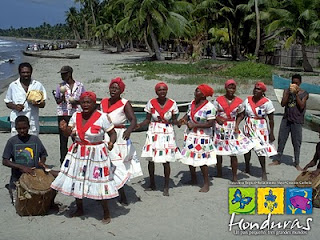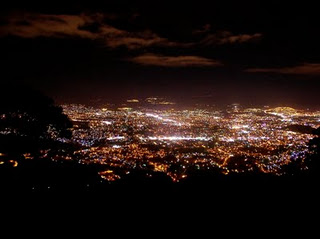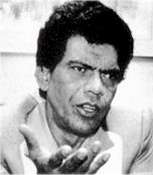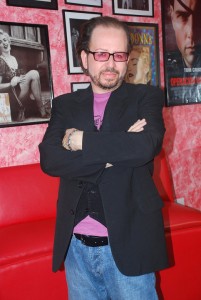
Currently there are two major groups very representative of Afro-Caribbean Blacks : the Garifuna and the English-speaking Blacks.
These latter were located mainly in the Bay Islands and La Ceiba with their own cultural particularities . Their population is approximately 20.800 people.
The Garifuna in their native language are called Garínagu, which in English means “Black Caribs”.” They have their origin in the Yurumain Island, also known as St. Vincent, West Indies Minors.
They are descendants of the Carib, Arawak and black Africans, who arrived on the island to escape the enslavement of the Spanish and Portuguese ships. In the seventeenth century some of these boats sank in front of the Yurumain Island ( St. Vincent) in which the slaves took refuge, mixing gradually with the native Caribs producing the emergence of the Garifuna people.
The Afro-Caribbean partnership resulted in the fussion of language and culture, augmented by the inter-ethnic procreation and subsequent arrival of cimarrones (runaway slaves) from other islands.
In 1793, St. Vincent became the property of Great Britain, which succeeded in defeating the Garifuna after a series of battles that highlighted the strength of the legendary leader Chatuyc. In 1797, the Garifuna were deported to Roatan Island and then to Trujillo Bay, in which they had good relations with the natives, according to some documentation. From the area of Trujillo, whose villages Cristales (Crystals) and Río Negro (Black River) still represent the traditional capital of the ethnicity, it begins the process of coastal dispersion resulting in the current geographic distribution.
The language that Black Caribs speak today is of Amerindian origin: the Arawak, of European influence (French, Spanish and English), which gave rise to the Garifuna language.
The Garifuna have formed in 47 communities in the departments of Cortes, Atlantida, Bay Islands, Colon and Gracias a Dios. They have a population of 250 thousand inhabitants, including settled populations in San Pedro Sula and Tegucigalpa. They are also in Belize, Guatemala and Nicaragua.
This population has a long and rich culture expressed in various socio-cultural factors, with an agricultural system that relies on the collective ownership of land used in household production for subsistence.
Their production system (fallow and crop rotation ) has allowed them to live in harmony with the land and its resources, thanks to their social organization, where women play a major role in agricultural and cultural activities. Also, many women contribute significantly to the family income, spending much of their time in the preparation and sale of casabe, bread and coconut oil.
The Garifuna social organization highlights the figure of the chief and the council of elders. In addition to the traditional occupations of agriculture and fishing they have a wide variety of foods and beverages, rich in proteins, vitamins and calories as the tatau (Garifuna soup with a variety of tubers, seafoods and coconut), the areba or manioc (large tortilla of baked cassava) and thehudutu (machuca). Among the drinks is the hin, a species of beer made from cassava; the Marmara, a beverage prepared with fermented corn and sugar cane juice.
As for singing, dancing and ritual, the most important and significant manifestation is , however, the Dágá, a rite dedicated to the dead in which the abaómahani is sung by women and the arumhani by men . There is also the punta, a fertility dance dedicated to people’s reproduction. The Chugé is also a rite dedicated to the spirits.
Most of the of them profess the Catholic faith, without abandoning their religious beliefs of the Dágá, and the Chagá (cult of the dead) which is a meeting for family unity.
Given the limited opportunities for training and local employment, many Garifuna men work as sailors (cooks, stevedores, cleaners and helpers) in commercial vessels and then migrate to the USA .
Among the first modern organizational efforts of the ethnic peoples is the foundation of the Organization of the Community of Crystals and Black River, a Garifuna association which in 1986 succeeded in titling the communal property of an area of 9 thousand hectares of land that is now invaded by the State itself.
In June 1977 a group of black leaders concerned about the future of their communities founded the Black Fraternal Organization of Honduras (OFRANEH) as a civic and protest entity.
The Garifuna community has built up its nutrition and lifestyle relying primarily on marine-coastal resources.
Source: Diario La Prensa, 28 January 1996. Quoted in the book “Historia de Honduras” by Miguel J. Suazo Padilla.


 Juan Ramon Matta Ballesteros, also known as Juan Ramon Matta Lopez, or Juan Ramon Matta del Pozo, was a very powerful Honduran drug dealer whose illegal deportation to the United States was very controversial, it was seen as an interference of that country in the internal affairs of Honduras, and as a flagrant violation of the Constitution.
Juan Ramon Matta Ballesteros, also known as Juan Ramon Matta Lopez, or Juan Ramon Matta del Pozo, was a very powerful Honduran drug dealer whose illegal deportation to the United States was very controversial, it was seen as an interference of that country in the internal affairs of Honduras, and as a flagrant violation of the Constitution. 